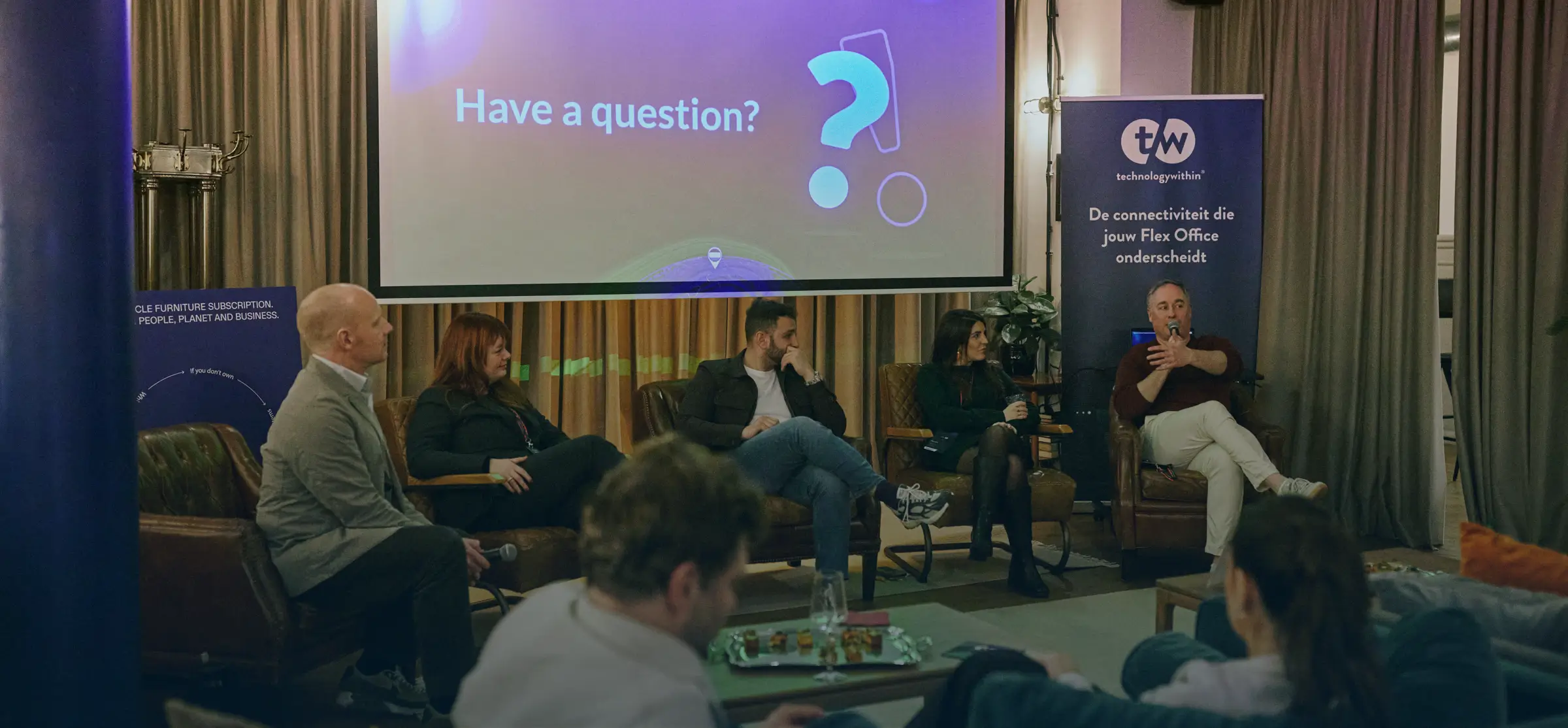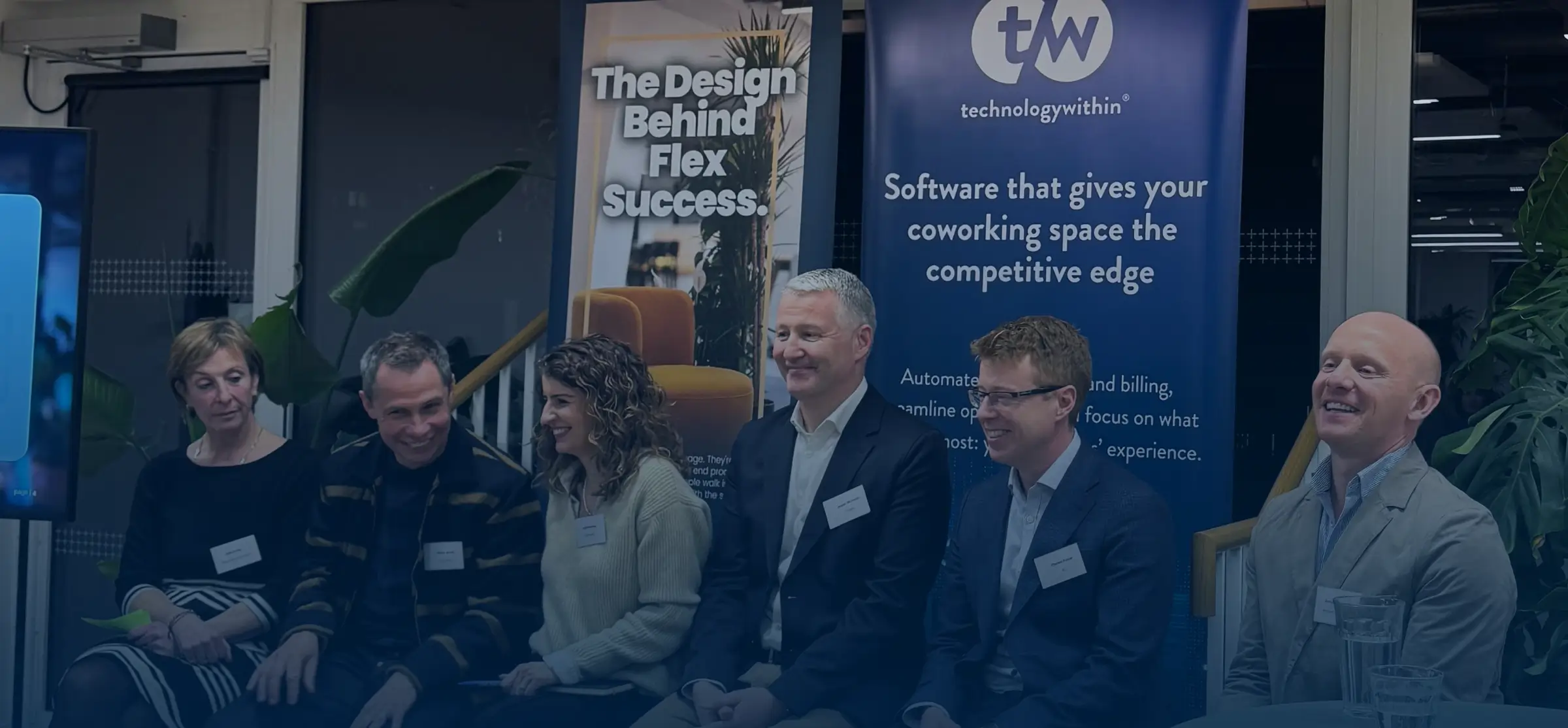
The German flex office market is evolving fast. Who’s leasing space, what’s driving demand, and where is the next big opportunity? At technologywithin’s recent Flex Connect networking event in Berlin, Florian Kappes, Director Europe at technologywithin, sat down with four key players in the industry to get their take. Flex Connect is technologywithin’s dedicated event series for the flexible workspace community, designed to bring leaders and innovators together from across the industry to share insights and spark discussion.
In a relaxed rooftop setting at Scaling Spaces Berlin, Lauren Elias (Customer Success Manager, Germany at Workaround), Sascha Hartmann (Executive Director at Contora Office Solutions), Domenico Trani (Senior Sales Manager at Simplioffice), and Julia Verch (Senior Sales Manager & Office Consultant at Design Offices) shared their frontline insights on market trends, customer behaviour, and the innovations shaping the future of flex space in Germany.
Big Names, Small Teams: Corporate Demand Shifts
The economic uncertainty of recent years hasn’t delivered the expected surge in flex office demand, something Sascha Hartmann described as “alarming.” Historically, downturns have been good for flex operators as companies sought alternatives to long-term leases. This time? Not so much.
But there’s a twist. Sascha noted a new wave of interest from larger corporate clients but with smaller space requirements. “We’re seeing more deals with big companies,” he explained. Instead of taking whole floors, corporates are booking space for agile project teams of 10–20 desks.
Lauren Elias echoed this trend: “Large companies are reaching out, but the scale is changing. Where they once needed 100 workstations, now they’re looking for 50 or fewer.” Workaround’s client base still includes many startups in Berlin and law firms in Frankfurt, but she agrees that demand is shifting across segments.
At Simplioffice, community demand is still strong from freelancers and small businesses, especially in Potsdam. But Berlin’s performance has been particularly impressive: “We were full one month after opening,” reported Domenico Trani, noting that a few larger firms grabbed multiple workstations early on.
Prime Cities Still Dominate But Keep an Eye on Leipzig
Location remains a key decision driver. Across the panel, the biggest demand remains concentrated in Germany’s major cities.
“For us, Berlin is always number one,” said Lauren. Munich and Frankfurt round out Workaround’s top three. Sascha ranked them differently: “It’s Munich, Frankfurt, then Berlin for us,” he said, adding that Hamburg, Düsseldorf, and Stuttgart also hold steady interest levels.
Contora’s strategy is clear – premium locations only. “It’s our philosophy to be in the front row,” Sascha explained. But there’s growing interest in select secondary markets. Both Sascha and Domenico flagged Potsdam and Leipzig as rising stars. “Leipzig is one of the best performers in our portfolio,” said Domenico. “For us, it’s no longer a B-location.”
No Unbundling: All-Inclusive Packages Still Rule
When it comes to pricing, the panellists agreed that the all-inclusive model is here to stay. While some in the industry have floated the idea of unbundling services to lower entry costs, the consensus was clear that customers want simplicity and value.
“Companies want to bring their employees back to the office but without forcing them,” said Julia Verch. That means making office time attractive with great coffee, engaging community management, and inviting outdoor spaces are all non-negotiables at Design Offices.
Lauren added that large companies are happy to pay for full-service packages, especially if perks like a gym or top-quality coffee are included. Simplioffice goes a step further by offering personal trainers and rotating fitness programs, which Domenico says are a big hit with members.
Sascha took a slightly different stance, noting that Contora clients prioritise office quality and professionalism over community events, but still expect an all-inclusive, hassle-free price. “Customers want one clear number that covers everything,” Julia agreed.
Robots in the Kitchen: Innovation in Unexpected Places
The conversation closed on a lighter note. Domenico unveiled Simplioffice’s latest innovation: a robotic kitchen at their Berlin location.
Capable of preparing up to 500 meals a day, this automated cooking system uses robotic arms and multiple induction hobs to deliver fresh, hot food around the clock. “We’ve replaced an entire kitchen team with one operator,” said Domenico. The goal? Offer members healthy meals 24/7, reinforcing Simplioffice’s community-focused amenities.
Eyes on Growth: What’s Next?
The panellists all agreed that growth remains the goal. Simplioffice is preparing to roll out white-label components of its concept for landlords with underutilised space. Contora, too, is focused on expanding its footprint. “The more space you have, the more fun it is,” said Sascha with a smile.
The discussion among the experts clearly showed that the flex office sector remains full of opportunities, innovation, and creative energy. Whether it’s robot-controlled kitchens, white-label space solutions, or evolving workspace models for corporate teams, providers are proving their ability to quickly adapt to shifting customer needs.
At technologywithin, we’re proud to play a role in this ongoing transformation. Through our Flex Connect event series, we’re helping to foster dialogue, spark new ideas, and strengthen the sense of community across the flex workspace industry. The best solutions often emerge from open exchange, and Flex Connect continues to deliver valuable market insights while bringing operators, partners, and innovators together.
Want to be part of the next Flex Connect? Or find out how technologywithin supports connectivity for flex operators across Germany and Europe? Get in touch!
Recent articles

Who’s Got the Flex Factor? The Battle for Coworking Success in the Netherlands

Coworking Trends in 2026
